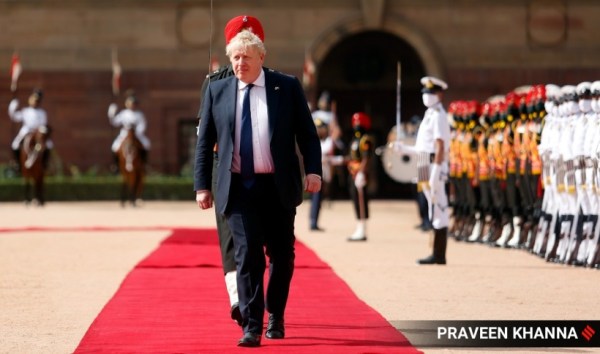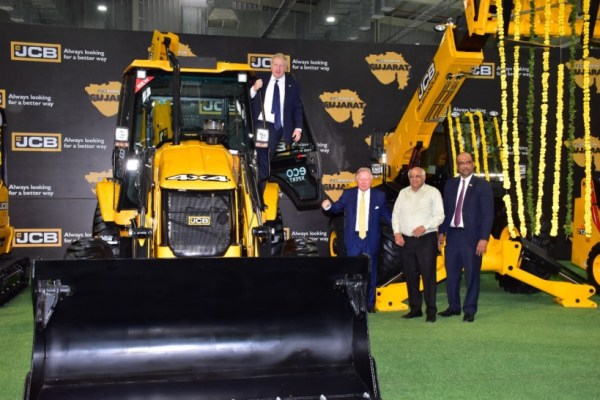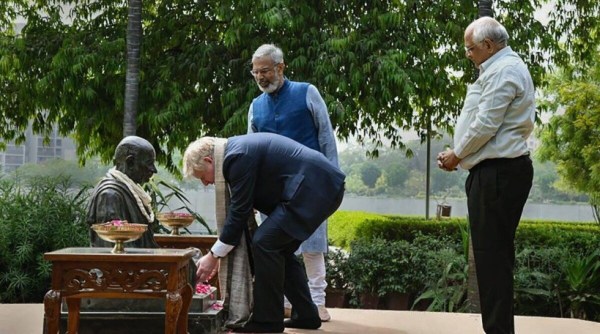
Underlining that India and UK are sticking together and confronting their “shared anxieties” about the “autocratic coercion” around the world, visiting Prime Minister Boris Johnson on Friday said that Prime Minister Narendra Modi has “intervened several times” with Russian President Vladimir Putin “to ask him what on earth he thinks he is doing, and where he thinks this is going.” And, he also said that what Indians want is “peace” and the “Russians out (of Ukraine).”
Johnson, who spoke at a press conference organised by the British High Commission after the bilateral meeting with PM Modi, steered clear of criticising India for not condemning Russia’s actions.
Responding to questions, he said, “I think you have to recognise that Indians have actually and Narendra Modi in particular have come out…very strong in their language about what’s happened in Bucha. And talking to PM Narendra Modi today, it’s clear that he has already intervened several times, and I’m sure this is no secret from our Indian friends…he has intervened several times with Vladimir Putin to ask him what on earth he thinks he is doing, and where he thinks this is going. And what the Indians want is peace and they want the Russians out. And I totally agree with that.”
He said that India has a “historic relationship with Russia” which “everybody understands and respects that goes back decades”. And he added, “But what was so interesting about the last couple of days has been the way in which Britain and India are being really encouraged, obliged, by the pressure of events today, as I say, autocratic coercion — whether it’s in Russia or China —wherever to do more together.”
The British PM, however, did not mention Ukraine or Russia during the press statements after the talks, with Modi by his side. He merely said, “It was great to see you at the G7. But since then, the threats of autocratic coercion have grown even further.”
But, later while interacting with the media, interestingly, he chose New Delhi to announce the re-opening of the British embassy in Kyiv, which he had visited earlier this month.
“Next week, we will reopen our embassy in Ukraine’s capital city. I want to pay tribute to those British diplomats who remained elsewhere in the region throughout this period.”
“The United Kingdom and our allies will not watch passively as Putin carries on this onslaught and what I think we’ve seen here in New Delhi is, one of the world’s oldest democracies, and the world’s largest democracy, sticking together and confronting our shared anxieties about autocracies and autocratic coercion around the world and acting together to make our countries safer and more prosperous”.
“Our new and expanded defence and security partnership will enable India to strengthen its own domestic defence industry as well as protecting vital shared interests in the Indo Pacific,” he said.
 Minister for Foreign Affairs, Dr S Jaishankar along with Union Minister Piyush Goyal and NSA Ajit Doval, during the meet with British Prime Minister Boris Johnson and PM Narendra Modi at Hyderabad House in New Delhi. (Express photo by Praveen Khanna)
Minister for Foreign Affairs, Dr S Jaishankar along with Union Minister Piyush Goyal and NSA Ajit Doval, during the meet with British Prime Minister Boris Johnson and PM Narendra Modi at Hyderabad House in New Delhi. (Express photo by Praveen Khanna)
On Ukraine, Modi, in his statement after the bilateral meeting, called for “immediate ceasefire” — a different formulation than the earlier language of “immediate cessation of hostilities and violence.” As in the past, he advocated “dialogue and diplomacy”, while mentioning the principle of “respect for territorial integrity and sovereignty.”
“We stressed on dialogue and diplomacy for an immediate ceasefire and resolution of the problem in Ukraine. We also reiterated the importance of respect for the territorial integrity and sovereignty of all countries,” Modi said.
Foreign Secretary Harsh Vardhan Shringla said there was “no pressure” (dabaav) from the UK during the talks on the Russia-Ukraine crisis. He said that the Prime Minister expressed “deep concern” at the situation and the “mounting humanitarian crisis” in Ukraine. Johnson, he said, provided “his perspective” and there was a “useful exchange of views” in “convivial terms.”
The joint statement said that the leaders expressed in “strongest terms their concern about the ongoing conflict and humanitarian situation in Ukraine.”
“They unequivocally condemned civilian deaths, and reiterated the need for an immediate cessation of hostilities and a peaceful resolution of the conflict, which was having severe implications across the globe, in particular for developing countries. They emphasised that the contemporary global order has been built on the UN Charter, international law and respect for sovereignty and territorial integrity of states. They reaffirmed their willingness to provide humanitarian aid for the people of Ukraine,” it said.
 UK Prime Minister Boris Johnson received the guard of honour on Friday morning at Rashtrapati Bhavan in New Delhi. (Express/Praveen Khanna)
UK Prime Minister Boris Johnson received the guard of honour on Friday morning at Rashtrapati Bhavan in New Delhi. (Express/Praveen Khanna)
In a bid to deepen defence cooperation, the UK will provide support for new Indian-designed and built fighter jets, offering the best of British know-how on building battle-winning aircraft.
The UK will also seek to support India’s requirements for new technology to identify and respond to threats in the Indian Ocean.
Johnson said that they discussed next-generation defence and security collaboration across the five domains – land, sea, air, space and cyber.
“We’ve agreed to work together to meet new threats across land, sea, air, space, and cyber including partnering on new fighter jet technology, maritime technologies to detect and respond to threats in the oceans,” Johnson said.
Modi said, “We have also agreed to enhance cooperation in the defence sector. We welcome the UK’s support for ‘Atmanirbhar Bharat’ in all sectors of manufacturing, technology, design and development in the defence sector.”
 UK PM Boris Johnson along with CM Bhupendra Patel visited the manufacturing plant of heavy equipment maker – JCB at Halol in Panchmahals district near Vadodara. He also interacted with workers of the company. (PTI)
UK PM Boris Johnson along with CM Bhupendra Patel visited the manufacturing plant of heavy equipment maker – JCB at Halol in Panchmahals district near Vadodara. He also interacted with workers of the company. (PTI)
The British government also said that “to support greater defence and security collaboration with India over the coming decade, the UK will issue an Open General Export Licence (OGEL) to India, reducing bureaucracy and shortening delivery times for defence procurement. This is our first OGEL in the Indo-Pacific region.”
In an oblique reference to Russia and China, British PM Johnson said, before the meeting, “The world faces growing threats from autocratic states which seek to undermine democracy, choke off free and fair trade and trample on sovereignty.”
The joint statement said that the two sides agreed to expand defence and security cooperation as a “key pillar of the India-UK Comprehensive Strategic Partnership and enhance engagements in support of a free, open and secure Indo Pacific”.
They welcomed the finalisation of the Letter of Arrangement between the UK’s Defence Science & Technology Laboratory and India’s Defence Research & Development Organisation to help deliver advanced security capabilities through “joint-research, co-design, co-development and joint production of defence technology and systems – particularly in key and emerging military technologies”. In that regard, the joint statement said that they welcomed the “establishment of a Joint Working Group on India-UK Electric Propulsion Capability Partnership with the goal of fostering military and industrial collaboration in maritime Electric Propulsion systems”.
“The leaders noted the importance of robust defence industrial collaboration for manufacturing of defence equipment, systems, spare parts, components, aggregates and other related products and key capabilities, under the Make-in-India program through co-development, indigenisation, transfer of technology and setting up of joint ventures for meeting the needs of the Armed Forces of India and other countries. They noted cooperation in key areas of strategic collaboration including Modern Fighter Aircraft and Jet Engine Advanced Core Technology. Both sides agreed to work bilaterally and with key partner countries to facilitate highest level access to technology to Indian industry. Prime Modi welcomed the UK announcement of an ‘open general export license’ to facilitate technology engagement with India, and the open opportunity for India to participate in the UK’s aviation and naval shipbuilding programmes,” the joint statement said.
The leaders agreed that the finalisation of the Logistics and Training MoUs will deepen understanding and trust and enable further collaboration and cooperation between the two nations. They agreed to “expand cooperation in the maritime domain and called for early conclusion of the Maritime Information Exchange Arrangement on dark and grey shipping”. They also called for increased engagements on critical and emerging domains of defence including space, Artificial Intelligence (AI) and cyber, it said.
The two Prime Ministers looked forward to the convening this year of the “Defence Ministerial Dialogue”, it said.
On cyberspace, they outlined commitment, in a Joint Cyber Statement, to deepen cooperation across cyber governance, deterrence and strengthen cyber resilience.
On Khalistani groups and concerns about anti-India activities in the UK, the British PM said that they have decided to form a new “anti-extremist task force”.
 Boris Johnson garlanded a statue of Mahatma Gandhi at the Sabarmati Ashram, in Ahmedabad, Thursday, April 21, 2022. The British Prime Minister also hailed the “people to people ties” between the UK and India and said he wanted to take it further. (PTI Photo)
Boris Johnson garlanded a statue of Mahatma Gandhi at the Sabarmati Ashram, in Ahmedabad, Thursday, April 21, 2022. The British Prime Minister also hailed the “people to people ties” between the UK and India and said he wanted to take it further. (PTI Photo)
The joint statement said, “They expressed satisfaction on the ongoing cooperation through the Joint Working Group on Counter-Terrorism (JWG-CT), including with regard to information and intelligence sharing on terror entities and individuals. Within this framework, they agreed to constitute a sub-group on countering extremism in order to further enhance cooperation between the two sides in ensuring that all possible actions are taken against groups and individuals based in or operating out of either country, seeking to incite violent extremism and terrorism and who are involved in financing such activities.”
It also said that both leaders expressed “zero tolerance for terrorism in all its forms – and for all those who encourage, support and finance terrorism or provide sanctuary to terrorists and terror groups – whatever their motivation may be. They called upon all countries to work together to root out terrorist safe havens and infrastructure, disrupt terrorist networks and their financing channels, and halt cross-border movement of terrorists. They reiterated their condemnation of terrorist attacks in India and the UK, including the Mumbai and Pathankot attacks”.
“They emphasised the importance of perpetrators of terrorist attacks being systematically and expeditiously brought to justice, and agreed to work together to take concerted action against globally proscribed terrorist entities and individuals,” the joint statement said, without naming Pakistan.
On Indo-Pacific, the joint statement said that they underlined their shared vision of an open, free, inclusive and rules-based Indo-Pacific region in which countries are free from military, economic, and political coercion. “Prime Minister Modi welcomed UK’s decision to join the Indo-Pacific Oceans Initiative (IPOI) and co-lead the pillar on Maritime Security to promote regional coordination and cooperation for securing and protecting the Indo-Pacific maritime domain.”